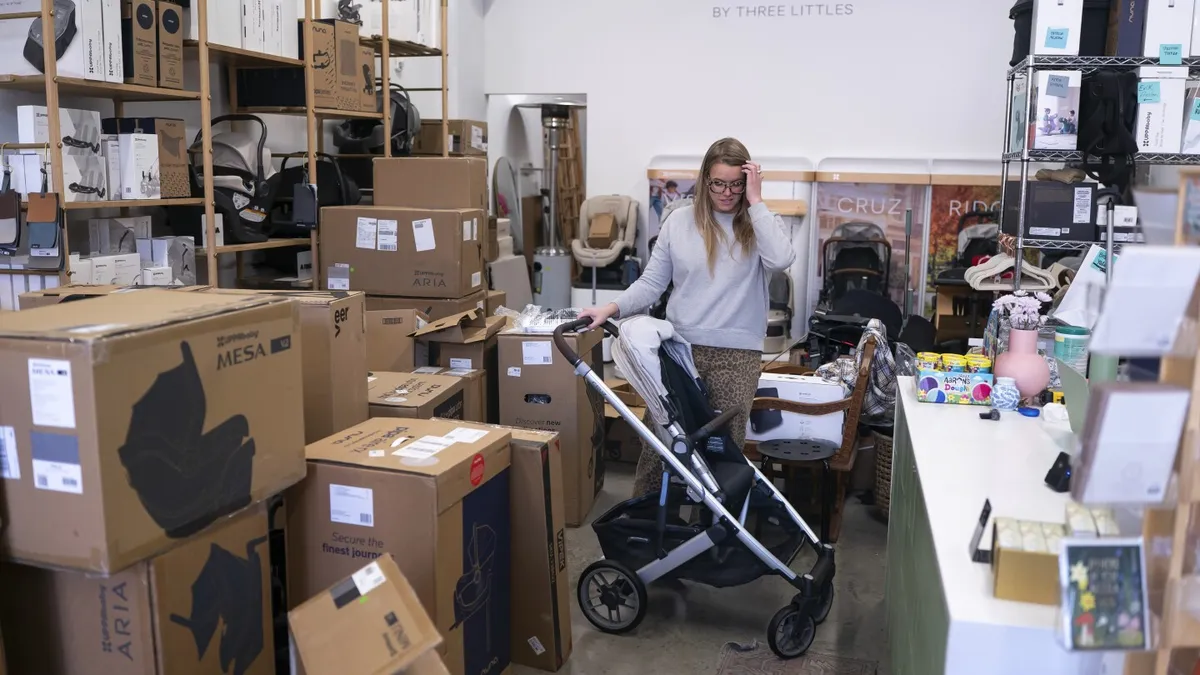
As Sam Rutledge and his wife prepare for the arrival of their baby due in mid-July, they initially thought they had ample time to research and purchase essential baby gear. However, the recent tariff announcement by President Donald Trump in early April transformed their leisurely shopping into a frantic race against time. In just a few weeks, the couple has acquired two strollers, a car seat, a nursery glider, a crib, and a high chair, all manufactured overseas. “These are all pretty expensive under normal conditions, but when it became clear that tariffs were coming, we decided to buy them in case they became prohibitively expensive,” said Rutledge, a high school physics teacher.
Raising a child in America has always been a costly endeavor. According to Baby Center, a well-known parenting website, the average cost for the first year alone is approximately $20,384. With the impending tariffs—ranging from 10% for imports from many countries to a staggering 145% for imports from China—the financial burden on new parents is set to increase significantly. An estimated 90% of core baby care products and the components that make up essential baby gear, such as bottles, diaper pails, strollers, and car seats, are predominantly manufactured in Asia, with a vast majority sourced from China, as reported by the Juvenile Products Manufacturers Association.
“Overseas manufacturing has been the norm in our industry for decades,” remarked Lisa Trofe, the executive director of the association. This trend contrasts sharply with the early days of the industry. When Munchkin Inc. CEO Steven Dunn founded his company in 1991, he produced baby bottles in California, utilizing tools sourced from New Jersey. However, due to rising costs and the shutdown of local manufacturers, Dunn has shifted approximately 60% of Munchkin’s 500 products—from affordable sippy cups to high-end strollers—to be made in China.
In direct response to the tariffs, Dunn has halted orders from China and implemented a hiring freeze at Munchkin's headquarters in California, which employs 320 people. He anticipates that Munchkin will run out of some products within three months and expressed skepticism about passing these tariff costs onto customers. “There is no possibility of being able to pass on those tariffs,” Dunn stated. Despite efforts to diversify manufacturing, including shifting some production to Vietnam and Mexico, Dunn noted that many American manufacturers lack the capability to produce complex silicone products, such as Munchkin’s new Flow Nipple Shield.
Many baby brands and companies have remained silent on the issue of tariffs, with notable names like Graco, Chicco, Britax, Nuna, Dorel Juvenile, UppaBaby, Evenflo, and Bugaboo either declining to comment or not responding to inquiries from the Associated Press. The Juvenile Products Manufacturers Association has sought tariff exemptions from the Trump administration, emphasizing that baby products are crucial for children's well-being. Although Trump exempted certain baby items, including car seats and high chairs, during his first term, it remains uncertain if he will consider similar measures again.
Companies like Nurture&, which specializes in nursery furniture, are attempting to maintain transparency about the effects of tariffs on their pricing. In a recent communication, Nurture& informed customers that while they had lowered prices on some items in response to the tariffs, sustaining these lower prices might not be feasible in the long term. “These are large purchases, these are investments, and this is a very sensitive life stage,” said Nurture& Chief Merchant Jill Gruys.
Elizabeth Mahon, owner of Three Littles, a baby store in Washington, expressed her concerns that tariffs may make essential baby items financially out of reach for some families. Mahon, who volunteers to help educate parents on the importance of using car seats, fears that rising prices could deter families from purchasing critical safety equipment. “If they don’t have access to car seats, kids will get seriously injured,” she warned.
At her store, Mahon is already facing notifications of steep price increases from manufacturers, with many planning to raise prices in May. She considers herself fortunate to have secured extra inventory before the tariffs took effect, as she notes that the additional costs could be catastrophic for many small businesses. Similarly, Molly Ging, owner of The Little Seedling in Ann Arbor, Michigan, is grappling with price increases from vendors while managing a team of 13 employees. “Business is brisk right now, but I worry about whether I can maintain enough inventory to meet future demand,” she said. “Babies don’t stop being born because there’s tariffs.”